Eight graduate students at universities in Florida have received Guy Harvey Scholarship Awards, recognizing their outstanding achievement in marine science research. The following winners received $5,000 scholarships:
- Erica Ross, University of Florida
- Brendan Talwar, Florida State University
- Luke McEachron, University of Florida
- Sara Thomas, Florida Atlantic University
- Mary Kate Swenarton, University of North Florida
- Ross Boucek, Florida International University
- Marcy Cockrell, University of South Florida
- Chris Malinowski, Florida State University
The scholarship, established in 2010 through a partnership between Florida Sea Grant and the Guy Harvey Ocean Foundation, recognizes students at Florida universities whose research focuses on the biology, ecology, habitat or management of fish in Florida’s marine environment. Since the award was established, $124,000 in scholarships has now been given to 27 students at nine different Florida universities.
Recipients also receive a certificate designed and signed by well-known marine wildlife artist and conservationist Guy Harvey. So far, awards have been given to students at the University of Florida, Florida State University, University of Central Florida, University of South Florida, University of Miami, University of North Florida, Florida Atlantic University, Florida International University and the Florida Institute of Technology.
“The recipients of the scholarship are the best and brightest of Florida’s college students who are conducting research dealing with marine fish or fisheries management issues,” said Karl Havens, director of Florida Sea Grant.
Steve Stock, president of the Guy Harvey Ocean Foundation, agreed. “We are delighted that this scholarship program is having such an impact, both in regard to supporting Florida college students and in supporting important research projects,” Stock said. “The partnership with Florida Sea Grant has been good for us, and good for aspiring marine science students and our oceans.”
This year’s research projects range from evaluating ways the Everglades snook fishery is influenced by freshwater flow to investigating how bioaccumulation of heavy metals affects goliath grouper.

Erica Ross
Erica Ross, a Ph.D. student in the fisheries and aquatic sciences program in the University of Florida’s School of Forest Resources and Conservation, is studying how climate change will impact the transmission of PaV1, a virus that infects juvenile spiny lobsters.
“Clearly, Erica has great potential to move the field of chemosensory ecology forward using a fishery species of particular interest to Florida,” said her adviser, Don Behringer, an associate professor at UF. “She not only has all of the academic skills and research experience to be successful, but she has the interpersonal skills to work well in a lab or field environment.”
After she graduates, Ross said she would like to get involved with a conservation organization or museum.
“I’m interested in outreach programs that educate children and local communities about marine science,” she said.
Brendan Talwar, a master’s student studying ecology and evolution at FSU, is estimating the post-release mortality rate for the Cuban dogfish and gulper shark, two commonly encountered deep-sea sharks that are regularly released by fishermen.
“Prior to our study, fisheries management assumed that these sharks would survive, as is common with many bycatch species,” Talwar said. “But our study has documented a far different outcome.”
Talwar said his main career goal is to inform fisheries management through research on economically-important fish and common bycatch species, particularly sharks, rays, and skates.
“I am also passionate about teaching and will continue to partner with high school and college groups whenever possible,” he said.
In his free time, Talwar spends as much time on the water as possible. He also has written and directed two educational films: The Story of Sharks and Eating the Enemy: Death to Lionfish.
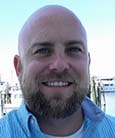
Luke McEachron
Luke McEachron, a Ph.D. student studying interdisciplinary ecology at UF, is investigating the relationships between reef fish and habitat. He is specifically interested in how reef fish communities respond to non-reef habitat such as sand and seagrass.
“Understanding where and why reef fish occur in some areas rather than others helps managers protect reef fish and associated habitat,” McEachron said.
Besides being a student, McEachron is also a marine ecologist at the FWC Fish and Wildlife Research Institute where he uses statistical methods to help guide sport fish managers.
“Moving from professional freshwater experience to a marine setting was a whole new ball game,” he said, referring to his job at the United States Geological Survey in Denver. “The research questions and projects were larger, more complex, and the data difficult to obtain, all at increasingly higher stakes.”
McEachron said that after he graduates, he would like to continue working as a research scientist for the FWC.

Sara Thomas
Sara Thomas, who recently graduated from Florida Atlantic University with a bachelor’s in marine biology, is studying the digestion rates of invasive lionfish. Her goal is to provide data that can be used to estimate their impact on native species in the Atlantic Ocean.
“My goal moving forward is to expand my research to other fish species such as snapper or grouper,” she said.
This fall, Thomas will be attending the University of the Virgin Islands to pursue her master’s degree in marine and environmental science.
“After that I plan to work as a fisheries biologist collecting and analyzing data to more effectively understand marine fishes as well as to ensure that regulations and management practices in place are still sustainable,” said Thomas.
But, Thomas isn’t one to be confined to a lab.
“I also enjoy speaking to and teaching others about marine biology,” said Thomas who recently gave a TED talk about sustainable seafood at FAU.
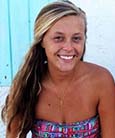
Mary Kate Swenarton
Mary Kate Swenarton, a master’s student studying coastal biology at UNF, is quantifying life history characteristics, such as growth rate, of invasive lionfish in several different regions of Florida.
“With this information, managers will be able to more accurately estimate population growth,” she said. “This way they can determine the removal effort needed to keep lionfish densities under threshold limits.”
With the scholarship funds, Swenarton hopes to develop a market demand for lionfish in Jacksonville.
“Developing a lasting commercial market for lionfish in northeast Florida is a goal of mine,” she said. “This market could reduce lionfish densities and, as a result, lionfish impacts long term.”
After she graduates, she intends to pursue a doctoral degree in fisheries management while working closely with the government and the public.
“My ultimate goal is to work as a fisheries biologist for the National Marine Fisheries Service or the Florida Fish and Wildlife Conservation Commission,” she said.
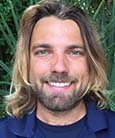
Ross Boucek
Ross Boucek, a Ph.D. student studying biology at FIU, is looking at how the Everglades National Park snook fishery is influenced by varied amounts of fresh water flowing into the estuarine habitat.
To do this, he is using acoustic telemetry, a method in which fish are tagged with small sound-emitting devices. Boucek is tracking these devices to determine the spawning effort and spawning rhythm of snook in the Everglades.
“Boucek’s research has obvious implications for FWC’s continued efforts to understand how snook use freshwater habitats,” said Philip Stevens, lead scientist and research administrator at FWC’s Charlotte Harbor Field Laboratory. “He took the initiative to contact us and work toward collaboration. Ross has made an impact on my career by reminding me of the spirit of collaboration and the fresh perspective that an eager student can bring.”
Boucek, who is also an active science blogger, is planning to pursue a career as a professor at a research-based university.
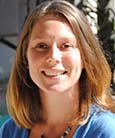
Mary Cockrell
Marcy Cockrell, a Ph.D. student studying marine science at USF, is investigating how three marine protected areas in the Gulf of Mexico might benefit both fisheries yields and spawning populations.
“My research will bring together fisheries biology, ecology and economics in order to more fully understand how marine protected areas can be used for effective fisheries management,” she said.
Cockrell’s research has garnered interest among other universities and agencies.
“She has undertaken an ambitious research program centered around the ecological and economic effects of marine protected areas on the West Florida Shelf,” said Cockrell’s adviser, Steve Murawski, an endowed chair of biological oceanography at USF. “There is extreme interest in her results because they will influence the placement of marine protected areas in the future.”
Cockrell said her career goal is to live in Washington, D.C. and to “work at the intersection of science and policy to help develop solutions to the many challenges that are facing global marine resources.”
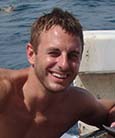
Chris Malinowski
Chris Malinowski, a Ph.D. student studying biological science at FSU, is looking at how the bioaccumulation of heavy metals, particularly mercury, is impacting the health and sustainability of goliath grouper.
“I hope to advance the field of ecology through furthering our understanding of peoples’ impacts on our oceans and fishes,” he said.
His lab adviser, Felicia Coleman, director of FSU’s Coastal Marine Laboratory, said his research is needed and timely.
“Given the current emphasis on restoration of essential habitat in Gulf of Mexico coastal systems, it will certainly help to know where mercury is distributed in nearshore environments,” Coleman said.
Malinowski is also a research technician at FSU’s Coastal and Marine Lab where he assists in data collection for a project looking at the environmental consequences of the Deepwater Horizon oil spill. He plans to pursue a career in academia as a research scientist.
The Guy Harvey Ocean Foundation is an organization of philanthropists, conservationists, scientists and educators that emphasizes sensible strategies for promoting ocean conservation and the development of the next generation of marine scientists. The foundation funds research and educational programs developed by universities, colleges, institutes and nonprofit organizations. Learn more about the Guy Harvey Scholarships winners on our Current Fellows page, or learn more about the scholarship itself.




